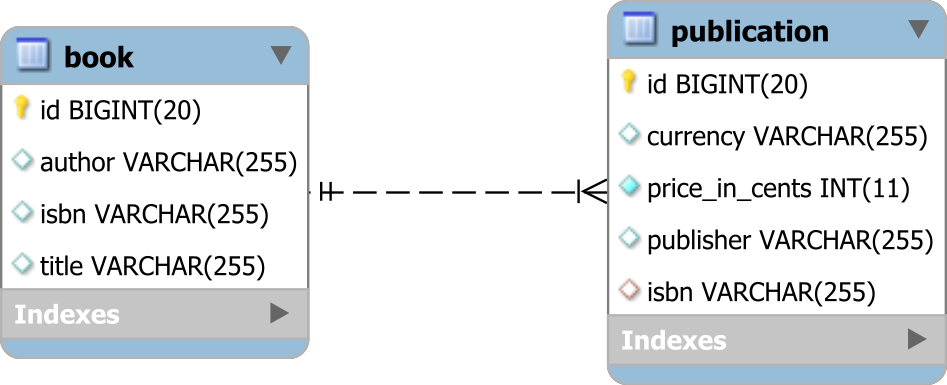How to map a @ManyToOne association using a non-Primary Key column with JPA and Hibernate
Imagine having a tool that can automatically detect JPA and Hibernate performance issues. Wouldn’t that be just awesome?
Well, Hypersistence Optimizer is that tool! And it works with Spring Boot, Spring Framework, Jakarta EE, Java EE, Quarkus, or Play Framework.
So, enjoy spending your time on the things you love rather than fixing performance issues in your production system on a Saturday night!
Introduction
While answering questions on the Hibernate forum, I stumbled on the following question about using the @ManyToOne annotation when the Foreign Key column on the client side references a non-Primary Key column on the parent side.
In this article, you are going to see how to use the @JoinColumn annotation in order to accommodate non-Primary Key many-to-one associations.
Domain Model
Assuming we have the following tables in our database:

The isbn column on the publication and book tables are linked via a Foreign Key constraint which is the base of our @ManyToOne assocation:

Non Primary-Key @ManyToOne mapping
The Book represents the parent side of the association, and it’s mapped as follows:
@Entity(name = "Book")
@Table(name = "book")
public class Book implements Serializable {
@Id
@GeneratedValue
private Long id;
private String title;
private String author;
@NaturalId
private String isbn;
}
The isbn column is mapped as a @NaturalId since it can be used as a business key as well. For more details about the @NaturalId annotation, check out this article.
Notice that the
Bookentity implementsSerializable. This is on purpose as otherwise you won’t be able to map this entity as an association via a non-Primary Key column.
The Publication represents the child of the association, so it’s going to be mapped like this:
@Entity(name = "Publication")
@Table(name = "publication")
public class Publication {
@Id
@GeneratedValue
private Long id;
private String publisher;
@ManyToOne(fetch = FetchType.LAZY)
@JoinColumn(
name = "isbn",
referencedColumnName = "isbn"
)
private Book book;
@Column(
name = "price_in_cents",
nullable = false
)
private Integer priceCents;
private String currency;
}
By default, the @ManyToOne association assumes that the parent-side entity identifier is to be used to join with the client-side entity Foreign Key column.
However, when using a non-Primary Key association, the referencedColumnName should be used to instruct Hibernate which column should be used on the parent side to establish the many-to-one database relationship.
Testing time
Assuming we have the following entities in our database:
Book book = new Book()
.setTitle("High-Performance Java Persistence")
.setAuthor("Vlad Mihalcea")
.setIsbn("978-9730228236");
entityManager.persist(book);
Publication amazonUs = new Publication()
.setPublisher("amazon.com")
.setBook(book)
.setPriceCents(4599)
.setCurrency("$");
entityManager.persist(amazonUs);
Publication amazonUk = new Publication()
.setPublisher("amazon.co.uk")
.setBook(book)
.setPriceCents(3545)
.setCurrency("&");
entityManager.persist(amazonUk);
Upon fetching the Publication along with its associated Book, we can see that the @ManyToOne association works as expected:
Publication publication = entityManager.createQuery("""
select p
from Publication p
join fetch p.book b
where
b.isbn = :isbn and
p.currency = :currency
""", Publication.class)
.setParameter("isbn", "978-9730228236")
.setParameter("currency", "&")
.getSingleResult();
assertEquals(
"amazon.co.uk",
publication.getPublisher()
);
assertEquals(
"High-Performance Java Persistence",
publication.getBook().getTitle()
);
When executing the JPQL query above, Hibernate generates the following SQL statement:
SELECT
p.id AS id1_1_0_, b.id AS id1_0_1_,
p.isbn AS isbn5_1_0_, p.currency AS currency2_1_0_,
p.price_in_cents AS price_in3_1_0_,
p.publisher AS publishe4_1_0_,
b.author AS author2_0_1_, b.isbn AS isbn3_0_1_,
b.title AS title4_0_1_
FROM
publication p
INNER JOIN
book b ON p.isbn = b.isbn
WHERE
b.isbn = '978-9730228236' AND
p.currency = '&'
As you can see, the referencedColumnName allows you to customize the JOIN ON clause so that the isbn column is used instead of the default entity identifier.
I'm running an online workshop on the 20-21 and 23-24 of November about High-Performance Java Persistence.
If you enjoyed this article, I bet you are going to love my Book and Video Courses as well.
Conclusion
If you want to represent a non-Primary Key @ManyToOne association, you should use the referencedColumnName attribute of the @JoinColumn annotation.
For more complex situations, like when you need to use a custom SQL function in the JOIN ON clause, you can use the Hibernate specific @JoinFormula annotation.











